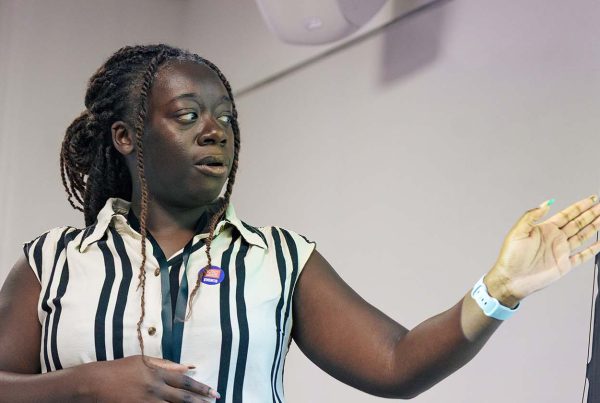Over the last few years, the environment of the global development sector has been under critical review. The debates on ‘Shifting the Power’, Decolonising Aid and the Localisation agenda all address the need to reshape the current power dynamics within the sector and shift to locally-led development[1]. The COVID-19 pandemic also enabled many underrepresented voices to be heard and showed the ability and resilience of local actors, who were overshadowed by their donors or funder counterparts.[2] The call for action, to change how the sector is organised was also amplified in this year’s The Women in Global Development Leadership (WILD) forum. During this forum, various leaders from the sector hosted and participated in sessions on the current needs of leadership in the global development sector. The sessions on Decolonising Aid, Strategies on Supporting Sub-Saharan Leadership and Feminist Leadership represented the collective call for action, namely shifting the power, addressing racial inequality, enabling locally-led development and the inclusion of underrepresented voices in decision-making processes.
These rising debates underline the urgency for greater equity in the sector and at the same time it reflects the hurdles the sector experiences in reforming. As Humentum[3] concluded in their research, the global development sector needs to adopt a new model that meets the complexity of the current environment and needs to assist in creating equity within organisations, and in partnerships between actors from the ‘Global South’ and ‘Global North’.
Dylan Mathews[4] rightfully points out that to adopt a new model, it is important to understand that although the debates on Shifting the Power, Localisation and Decolonising Aid are used interchangeably, when addressing the need for more equitable structures within the sector, they do not necessarily mean the same. The movements around Decolonising Aid and Shifting the Power are a response from the ‘Global South’ and challenge the hegemonic power from the ‘Global North’. It is partly based on the work of critical thinkers on the concept of Decoloniality. This concept analyses critiques and challenges the hegemonic social, cultural, and educational norms implemented by neo-colonial relations. It also examines how these dynamics have lasting effects on today’s society. [5]
The Localisation agenda can be seen as a counter response from the ‘Global North’. The latter, however, receives critique for shying away from addressing the racial inequity and power inequity within the sector[6]. In a way, the Localisation agenda symbolises what Schmitz et al.[7] calls the ‘paradox of the global development sector’ on the topic of ‘shifting the Power’: ‘they [Global North actors] cannot stay relevant and legitimate without truly giving up power to Southern voices, but they cannot maintain their current power and influence without catering to Northern priorities’. The paradox also shows that although the majority of ‘Global North’ actors are aware of the need for change in the current power dynamics, relations and funding structures, these actors are ‘struggling to translate intentions and aspirations into practical action, or in other words, to “operationalize equity” in their organizations’[8] .
In these transitional times, where normative standards that have been there for decades are being challenged, organisations need to carefully re-examine those in powerful positions and rethink how leadership is being exercised. Leadership is an essential component that needs to be considered while discussing organisational change. Leaders not only have to lead the change, but they also must determine how and in what way the change is prioritised within the organisation[9]. Within the global development sector, leaders usually have a mission-driven desire, a strong sense of justice and are not led by the motivation of money[10]. As Joost Guijt from the Wageningen Centrum for the Development Innovation noted, leadership within the global development sector deals with multiple forms of complexities, where one needs to lead an international organisation and to also fully understand the complex social civic space the organisation is active in. The complexity of the sector emphasises that leadership and the concept of a leader is tightly bound to contextualisation, not only of one’s cultural and professional environment but also of one’s personal life. [11]
A framework that has embraced the principle of sharing power and challenging the status quo and that has been widely adopted by those striving for social justice in the last decade, is Feminist Leadership. This form of leadership is mainly practiced in social justice movements in the Global South[12] and is gaining recognition among more actors in the sector. This form of leadership is built upon feminist movements that strive for equality for all sexes, meaning this form of leadership is not only for women, it is for everyone that believes in equity.
History
The first feminist approaches to the concept of leadership were written as a critique on the heavily male perspective in leadership theories of the last century. The various feminist interpretations, on the concept of transformational leadership, eventually gained momentum among women, especially in political offices[13]. Fletcher[14] made an important contribution to the analysis of feminist leadership by looking at the complexity of (organisational) context and including gender and power as interlinkages rather than treating these elements separately. In 2011, Srilatha Batliwala developed a framework for Feminist Leadership for CREA, a feminist international human rights organisation based in the Global South[15]. In this framework, Batliwala builds on critiques of various scholars who also raised concerns on the gender blindness within leadership frameworks. According to Batliwala, Feminist leadership is a form of leadership where: “Women with a feminist perspective and vision of social justice, individually and collectively transforming themselves to use their power, resources and skills in non-oppressive, inclusive structures and processes to mobilize others—especially other women—around a shared agenda of social, cultural, economic and political transformation for equality and the realization of human rights for all.[16]” In her framework, she identifies essential components of Feminist Leadership: Power, Principles / Values, Politics / Purpose and Practices. These elements are used interchangeably while at all times, recognising role of the self. This framework engages in an intersectional approach towards leadership, where all various facets of one’s identities ( one’s history, gender, race, socioeconomical background etc.) are being taking into consideration. Self-reflexivity is essential, not only on a personal level, but also on organisational, cross organisational and society wide level. [17]
The growing attention for and importance of this framework were noticeable during the annual WILD forum, where multiple sessions directly or indirectly referred to the principles of Feminist leadership. International NGO´s such as ActionAid International have implemented this framework into their organisational structures in an attempt to create a “transformative vision of a just world free from poverty, oppression and patriarchy”[18]. Based on the work of Batliwala, ActionAid International developed the following ten principles that, in their view, describe Feminist Leadership best:
- Self-Awareness;
- Self-Care and caring for others;
- Dismantling bias;
- Inclusion;
- Sharing Power;
- Responsible and transparent use of power;
- Accountable Collaboration;
- Respectful feedback;
- Courage;
- Zero Tolerance.
ActionAid International is not the only organisation that engages with this framework. For instance, Mama Cash, have, as part of their new approach to leadership, taken the opportunity to create a model of Co- Executive Directors that embraces the feminist principle of the shared power[19] . This example makes it explicit what role leadership plays and can play a role in the long-awaited change in the global development sector.
The Feminist Leadership framework enables organisations to address the power imparity and inequalities present in their structures. As mentioned earlier, the sector has a history of neo-colonial practices that entail various inequalities. To create more equity, those in power, namely those in the Global North, need to reshape their practices. The framework of Feminist Leadership has been proven successful in providing the right tools to initiate change internally, not only on an individual level, but on an organisational level as well. The road towards equity within the global development sector is challenging and certainly not linear. Transforming your organisation is a longitude process and if an organisation decides to engage with this particular leadership framework, the leadership team needs to set the example and by getting comfortable with being uncomfortable. Because without friction there will be no change.
[1] Kumar, R., (2022). 5 Trends Shaping Global Development in 2022. Devex. https://www.devex.com/news/5-trends-shaping-global-development-in-2022-102375; Daud, Yussuf. ( 2021): “Localisation of Aid- The Future of Non Profit Leadership In Africa. ; 1-14.; Sow, C. (2022) Opinion a necessary operating model for equity in global development https://www.devex.com/news/sponsored/opinion-a-necessary-operating-model-for-equity-in-global-development-103400
[2] Sow, C. (2022) Opinion a necessary operating model for equity in global development https://www.devex.com/news/sponsored/opinion-a-necessary-operating-model-for-equity-in-global-development-103400
[3]Humentum. (2021). https://humentum.org/resources/executive-summit-summary/
[4] Dylan Mathews (2022) https://shiftthepower.org/2022/06/14/localization-decolonizing-and-shiftthepower-are-we-saying-the-same-thing/
[5] Paige, S. (2021). Time to decolonise aid: insights and lessons from a global consultation. Peace Direct. https://www.peacedirect.org/publications/timetodecoloniseaid/; E- International Relations. (2017). Interview – Walther Mignolo/ Part 2: Key Concepts. . https://www.e-ir.info/2017/01/21/interview-walter-mignolopart-2-key-concepts/; Oelofsen, 2012; Racial Equity Tools. (n.d.) Decolonization Theory and Practice. https://www.racialequitytools.org/resources/fundamentals/core-concepts/decolonization-theory-and-practice
[6] Mathews, Dylan (2022) https://shiftthepower.org/2022/06/14/localization-decolonizing-and-shiftthepower-are-we-saying-the-same-thing/
[7] Schmitz. H.P., Mitchell, G. E., & Bruno -van Vijfeijke T. (2019). The Dilemma of Northern NGOs. Stanford Social Innovation Review. https://ssir.org/articles/entry/the_future_of_transnational_ngo_advocacy
[8] Sow, C. (2022) Opinion a necessary operating model for equity in global development https://www.devex.com/news/sponsored/opinion-a-necessary-operating-model-for-equity-in-global-development-103400
[9] Mansaray, H. E. (2019). The role of leadership style in organisational change management: a literature review. Journal of Human Resource Management, 7(1), 18-31.
[10] Stewart, A. J., & Kuenzi, K. (2018). The nonprofit career ladder: Exploring career paths as leadership development for future nonprofit executives. Public Personnel Management, 47(4), 359-381..
[11]Kuada, J. (2010) Culture and leadership in Africa: A Conceptual Model and Research Agenda: African Journal of Economic and Management Studies, 1(1), 9-24.
[12] FairSharewl (n.d.). Feminist Leadership. https://fairsharewl.org/feministleadership/.
[13] Wakefield, S. (2017). Transformative and feminist leadership for women’s rights. Oxfam America Research Backgrounder Series.
[14] Fletcher, J. (2004). “The Paradox of Post Heroic Leadership: An Essay on Gender, Power and Transformational Change,”
[15] Batliwala, S. 2011. Feminist leadership clearing conceptual cloud https://justassociates.org/wp-content/uploads/2022/02/feminist-leadership-clearing-conceptual-cloud-srilatha-batliwala.pdf
[16] Batliwala, S. (2011, p. 14). Feminist leadership clearing conceptual cloud https://justassociates.org/wp-content/uploads/2022/02/feminist-leadership-clearing-conceptual-cloud-srilatha-batliwala.pdf
[17] Wakefield, S. (2017). Transformative and feminist leadership for women’s rights. Oxfam America Research Backgrounder Series.
[18] Action Aid International (n.d.). ActionAid’s Ten Principles of Feminist Leadership. https://actionaid.org/feminist-leadership.
[19] Mama Cash. (2022). https://www.mamacash.org/en/sharing-power-a-new-model-of-leadership#:~:text=Last%20year%2C%20Mama%20Cash%20launched,Cash%20supports%20to%20share%20power.

Hannah Postma
Hannah is based in Utrecht, The Netherlands. She holds a bachelors in Cultural Anthropology and a Masters in Culture, Organization and Management. Hannah believes that organizations can benefit if complex issues are being analysed through an anthropological lens. She started at Oxford HR as part of the post master program Advanced Master in International Development offered by Radboud University Nijmegen. With this post master she hopes to further develop her knowledge on the topic of International Development and apply this to her current position within Oxford HR. She aspires to further her expertise on organisational change particularly on the topic of leadership and how to detect future leaders in the For-Purpose sector.



